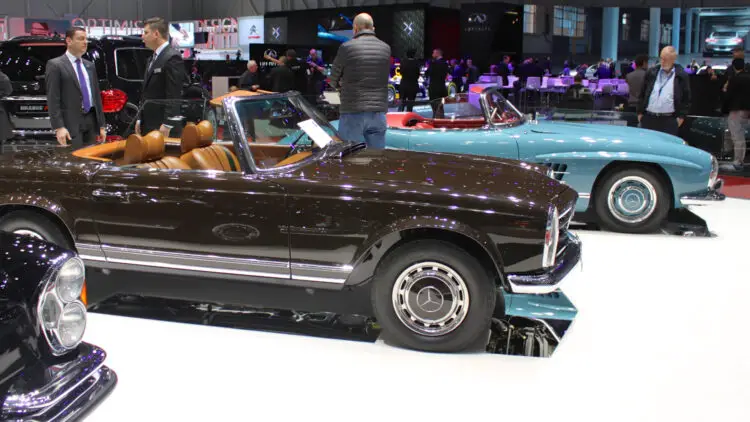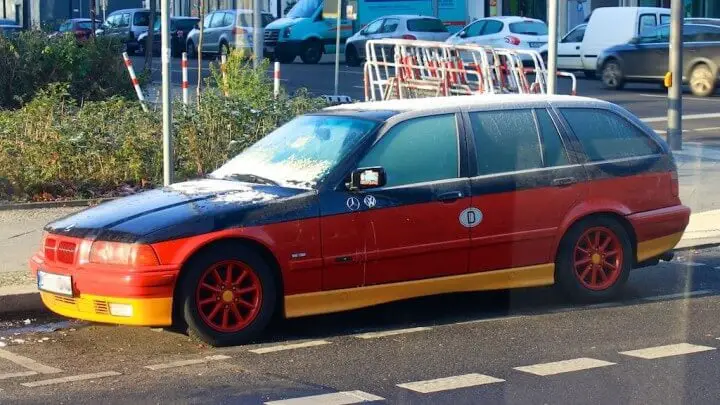On January 1, 2015, the total number of cars registered in Germany was 44,403,124 – 1.3% more than in 2014. VW, Opel, and Mercedes were the top brands.
In the annual survey of the total number of passenger vehicles registered for use on roads in Germany (Fahrzeugbestand), Dacia, Jeep, and Hyundai saw double-digit increases in the number of cars registered, while MG Rover, Daihatsu, and Chrysler saw the largest drop in branded cars registered.
See also: 2016 Germany: Total Number of Registered Cars
Total Number of Vehicles Registered in Germany in 2015
The total number of vehicles registered in Germany (Fahrzeugbestand) on January 1, 2015, according to the KBA was a new record 62.4 million vehicles – an increase of 900,000 vehicles from a year ago.
The total number of vehicles (Gesamtbestand) at the start of 2015 consisted of 53,715,641 (+1.3%) motorized vehicles (Kraftfahrzeugen / Kfz) and 6,674,250 (+2.7%) trailers (Kraftfahrzeuganhänger).
Passenger vehicles (Personenkraftwagen / PKW) were by far the largest number – 44,403,124 cars (+1.3%) cars were registered in Germany. New car sales in 2014 were just over 3 million. German brands made 65.1% of all cars currently registered in Germany.
Petrol engines remained the most popular form of propulsion – 67.2% – followed by diesel at 31.2%. The number of hybrid vehicles registered in Germany increased by 25.9% to 107,754 cars while electric cars increased by 55.9% to 18,948 cars.
The average age of all cars registered in Germany at the start of 2015 was 9 years. The number of old-timers (cars older than 30 years) increased to just less than a million (493,659), of which 350,000 have historical number plates.
Cars Registered in Germany by Brand in 2015
According to car registration statistics released by the KBA, the following brands were the most popular for all passenger cars in use in Germany on January 1, 2015:
| Brand | 2015 | % Share | 2014 | % Change | |
| Total | 44,403,124 | 100 | 43,851,230 | 1.3 | |
| 1 | VW | 9,568,633 | 21.5 | 9,423,357 | 1.5 |
| 2 | Opel | 4,784,141 | 10.8 | 4,895,379 | -2.3 |
| 3 | Mercedes | 4,152,334 | 9.4 | 4,089,440 | 1.5 |
| 4 | Ford | 3,339,043 | 7.5 | 3,349,105 | -0.3 |
| 5 | BMW | 3,011,032 | 6.8 | 2,939,655 | 2.4 |
| 6 | Audi | 3,004,819 | 6.8 | 2,917,077 | 3 |
| 7 | Renault | 1,868,200 | 4.2 | 1,908,287 | -2.1 |
| 8 | Skoda | 1,628,106 | 3.7 | 1,497,233 | 8.7 |
| 9 | Toyota | 1,320,454 | 3 | 1,323,562 | -0.2 |
| 10 | Peugeot | 1,226,688 | 2.8 | 1,248,499 | -1.7 |
| 11 | Fiat | 1,145,494 | 2.6 | 1,152,379 | -0.6 |
| 12 | Seat | 890,358 | 2 | 835,631 | 6.5 |
| 13 | Mazda | 854,251 | 1.9 | 866,321 | -1.4 |
| 14 | Hyundai | 852,131 | 1.9 | 769,831 | 10.7 |
| 15 | Nissan | 827,076 | 1.9 | 824,942 | 0.3 |
| 16 | Citroen | 800,306 | 1.8 | 797,693 | 0.3 |
| 17 | Kia | 512,321 | 1.2 | 475,439 | 7.8 |
| 18 | Honda | 493,641 | 1.1 | 503,226 | -1.9 |
| 19 | Mitsubishi | 453,590 | 1 | 463,822 | -2.2 |
| 20 | Suzuki | 453,533 | 1 | 447,922 | 1.3 |
| 21 | Volvo | 450,157 | 1 | 444,199 | 1.3 |
| 22 | Smart | 398,300 | 0.9 | 388,232 | 2.6 |
| 23 | Dacia | 339,389 | 0.8 | 292,028 | 16.2 |
| 24 | Mini | 317,653 | 0.7 | 294,239 | 8 |
| 25 | Chevrolet | 270,432 | 0.6 | 274,143 | -1.4 |
| 26 | Porsche | 234,680 | 0.5 | 214,507 | 9.4 |
| 27 | Alfa Romeo | 142,901 | 0.3 | 149,378 | -4.3 |
| 28 | Subaru | 123,981 | 0.3 | 124,839 | -0.7 |
| 29 | Daihatsu | 110,661 | 0.2 | 119,591 | -7.5 |
| 30 | Chrysler | 84,314 | 0.2 | 90,504 | -6.8 |
| 31 | Land Rover | 80,292 | 0.2 | 74,257 | 8.1 |
| 32 | Jeep | 72,198 | 0.2 | 64,196 | 12.5 |
| 33 | Jaguar | 56,112 | 0.1 | 53,898 | 4.1 |
| 34 | Saab | 54,618 | 0.1 | 57,267 | -4.6 |
| 35 | Lancia | 42,872 | 0.1 | 45,898 | -6.6 |
| 36 | MG Rover | 42,269 | 0.1 | 47,002 | -10.1 |
| 37 | Sachsenring | 32,832 | 0.1 | 32,311 | 1.6 |
| 38 | Lexus | 24,901 | 0.1 | 24,693 | 0.8 |
| Others | 338,411 | 0.8 | 331,248 |
Ten Most Popular Car Brands on German Roads in 2105
There were no changes in the order of the top ten most-popular car marques in Germany at the start of 2015 compared to 2014. As the total car parc is in play here, only very minor changes in rank positions are seen lower down the list.
Volkswagen has been the most popular car brand in Germany for decades, so it is no surprise that it remains by far the most common car brand on German roads in 2015. Although Opel has slipped to only fifth place in the new car sales rankings, Opels remain the second most common cars in Germany. However, Opel has seen the biggest percentage decline of the top 25 brands in Germany. The number of Fords also declined a bit but not as drastic as Opel.
So-called premium car brands Mercedes-Benz, BMW, and Audi are increasingly more common on German roads. The number of Audis in Germany is likely to overtake the number of BMWs during 2015.
Renault remains the most common foreign car brand on German roads in 2015 but the French brand is slipping fast and likely to be overtaken by VW-owned Skoda soon. Skoda was the most improved of the top-ten brands and gained nearly 70,000 cars over Renault on new car sales alone in 2014.
The number of Toyotas in Germany was slightly down while Peugeot remained the tenth most common brand despite a 1.7% decline.

Cars in Germany in 2015
A few further salient figures from the statistics of the total number of cars registered in Germany on January 1, 2015:
- VW-owned Seat overtook Mazda while Hyundai overtook both Nissan and Citroen; Kia swapped places with Honda, while Dacias are now more common in Germany than BMW-owned Mini.
- The highest percentage increases were for Dacia, Jeep, and Hyundai with double-digit growth. Porsche (+9.4%) may be a homage to its durability or a dilution of the brand with cheaper SUVs.
- The worst performers were brands no longer sold on (or for all practical reasons withdrawn from) the German market: MG Rover, Daihatsu, Chrysler, and Lancia. Chevrolet, which has withdrawn from Germany at the end of 2014, is likely to join this group in coming years.
- Sachsenring – the producer of the East German Trabi car – has a surprising increase in the number of cars registered in Germany. (As a car, it is horrible but it is nearly impossible to destroy or to recycle.)

